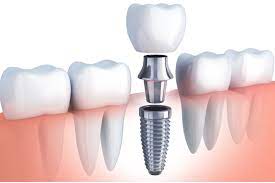+918045133587

This is your website preview.
Currently it only shows your basic business info. Start adding relevant business details such as description, images and products or services to gain your customers attention by using Boost 360 android app / iOS App / web portal.
Many patients who wish to have dental implants to ...

Many patients who wish to have dental implants to replace their lost teeth have frequently questioned me, "Are dental implants safe if I want to get MRi for whatever reason?" Let's examine this in more depth. MRI is a technique that is often used in the diagnosis, staging, and monitoring of disorders. Because it has excellent soft tissue contrast and is thought to be safer than other modalities because it does not expose the body to radiation, MRI is a beneficial diagnostic tool for imaging the musculoskeletal system and the brain. MRI does not, however, come without hazards. Due to strong magnetic field interactions, a metal implant in the patient's body during an MRI scan might be harmful. Medical advancements have led to the use of various implants, such as dental and orthopedic implants, in our bodies. The materials used in dental implant systems normally adhere to worldwide consensus standards set out by the Worldwide Organisation for Standardisation (ISO) or ASTM International. These criteria define what makes a safe drug. The vast majority of dental implant systems are made of titanium or zirconium oxide. There are instances when other materials like gold alloys, titanium alloys, cobalt-based alloys, or ceramic materials are employed. These materials' safety characteristics are widely recognized. In various research conducted over the past three decades, the safety, compatibility, and imaging diagnostic artifacts of surgical titanium implants have been examined. The majority of nonferromagnetic implants are generally safe for patients in MRI, according to nearly all studies. Strong magnets used by MRI machines make metal implants particularly susceptible to implant migration and radiofrequency heating, both of which might harm the tissue around the implant. Due to its paramagnetic nature, titanium is unaffected by the MRI's magnetic field. Implant-related problems are extremely unlikely to occur, making it safe for patients to utilise MRI. However, alloys are employed to make the titanium plates used in the craniofacial region. Because the effects of MRI rely on the ratio of the alloy's components, further precise investigation is required. Titanium Implants that are securely anchored to the bone are not impacted by MRI-induced displacement, according to studies. And Dental implants are strongly fixed inside your dental bone Image artifacts caused by metal implants might lead to incorrect results being interpreted. The use of modified magnetic resonance pulse sequences and improved scanning settings can reduce picture distortion. Physicians must weigh the benefits of imaging against the potential for implant-related picture distortion when determining whether to subject patients to MRI In conclusion, if you have dental implants, you do not need to be concerned about having an MRI operation. Just make sure the dental implants utilized are of excellent quality and made of titanium by checking with your dentist. FOR FURTHER DETAILS, CALL OR VISIT US DENTAPEX DENTAL CLINIC MUTHANALLURU CROSS, MARATHALLI-SARJAPUR ROAD BANGALORE 8369169473

